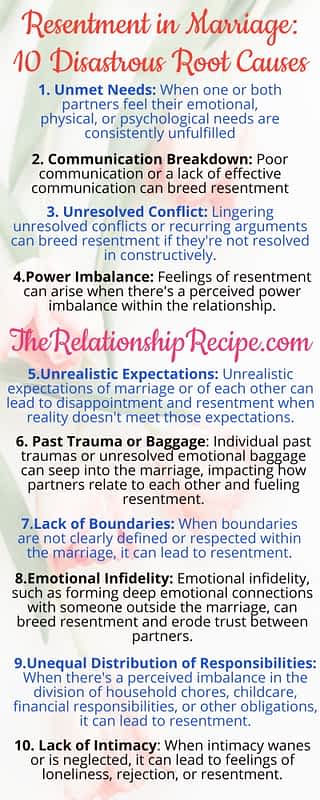Resentment in Marriage: The 10 Disastrous Root Causes
Resentment in marriage is like this silent poison. It sneaks in slowly, eating away at the love and trust you thought was rock solid. It often starts small: a little disagreement, an expectation that didn’t get met, but if you ignore it, resentment can snowball into a massive wall between you and your partner. That feeling of hate in marriage usually grows from these unnoticed signs of resentment. Knowing what causes it can save your relationship before it’s too late.
💡Key Highlights:
- The subtle emotional build-up that quietly poisons relationships before either of you notice.
- How “minor annoyances” aren’t so minor when they’re layered on top of deeper wounds.
- What consistent emotional imbalance does to long-term love, and why it’s rarely about just one thing.
- The surprising reason why effort can feel like rejection when it’s not mutual.
- A powerful shift in perspective that helps you decide if it’s burnout… or a breaking point.
Example of How Resentment in Marriage Starts
In my experience, resentment in marriage has been hanging around between my husband and me for years. I’ve always wanted to be a “good wife” and keep the peace, so I ended up stuffing down my anger.
The truth is, if I didn’t hold it all in, we’d probably be fighting nonstop.
👉Here is a typical day for me:
I get up, and clean the kitchen from last nights dinner. I see dishes in the sink that no one bothered to soak, or at least rinse. The food is now crusted, dried, and glued on from sitting like that all night. (To be honest, my kids do this as well. Thats another story.)
Despite my asking over and over to please at least soak your dishes.
Then, I go to the dishwasher and the dishes are arranged haphazardly, making it difficult for the dirty dishes to get cleaned.
Despite my patient “teaching” over and over how to properly load a dishwasher.
Then, I go to take a shower. I step on the bath mat next to shower and cold water squishes between my toes.
Despite my asking over and over to please dry off in the shower instead of stepping out dripping wet.

You can see how these little frustrations add up: Every. Single. Day. For 30+ years.
Do my complaints sound petty? Maybe, but no one could say I’m asking for the world either. I don’t ask for much, and it would be nice to get some support for something so simple, yet helpful. Oh, and to feel heard.
🚀These seemingly minor things would mean the world to me, because then I’d feel heard, respected, and valued.

I find myself getting angrier as the day goes on. By the time my husband gets home, I’ve had to talk myself down just to avoid an explosion. It’s not that I don’t appreciate the things he does – I really do. But when he brings up an issue with me, I make the effort to change. If I’ve had to be asked more than once, it hasn’t been often. Meanwhile, I’ve voiced my concerns repeatedly, and nothing changes.
These issues may seem small on their own, but the daily frustration, piled on top of the bigger problems we’ve faced, has worn me down. Over time, the love and motivation I once had have faded. Why keep trying if it always feels one-sided?

4 Stages of Resentment in Marriage
Resentment doesn’t just pop up out of nowhere; it sneaks in slowly, creeping through different stages that only make things worse over time.
At first, it might just feel like disappointment or frustration because something you needed or expected didn’t happen. But if those feelings stick around and you don’t deal with them, they can turn into full-blown resentment.
Usually, resentment in marriage goes through four main stages:
💔1. Denial and Dismissal: At the start, you might tell yourself your feelings aren’t a big deal, pushing them aside instead of facing them head-on.
💔2. Internalization: Then resentment starts to stew inside. You carry around anger, disappointment, or even betrayal, and start pulling away emotionally from your partner without even realizing it.
💔3. Escalation: If you still ignore it, resentment kicks up the heat; small fights turn into big arguments, and tension hangs over everything.
💔4. Detachment: Finally, resentment can leave you feeling emotionally checked out. You might feel indifferent or just plain done with your spouse, and that distance eats away at the trust and closeness you once had.

Signs of Resentment Towards Your Spouse
Knowing the signs of resentment in marriage can really help you catch it before it messes things up. Resentment doesn’t just sit quietly in the background—it sneaks in and shows up in ways you might not even notice at first.
Signs of resentment in marriage to watch for:
🚩Feeling constantly irritated or angry around your partner (or even when they’re not there): This kind of simmering frustration is one of the clearest signs of resentment in marriage. When those feelings stick around, they start poisoning the connection you thought was solid.
🚩Dwelling on past grievances and resentments: Hate in marriage often builds from holding onto old hurts instead of letting them go. When you keep replaying those moments in your head, resentment deepens and makes it harder to move forward.
🚩Avoiding communication or withdrawing emotionally: Instead of talking things out, you might shut down or pull away. This emotional distance only feeds resentment, creating a growing gap between you and your partner.
🚩Criticizing or blaming your partner over little things: When resentment builds, it’s easy to point fingers or nitpick. This blame game often masks deeper frustrations that haven’t been addressed.
🚩Experiencing a lack of intimacy or connection: Resentment is a major cause of distance in the bedroom and beyond. When you’re emotionally checked out, it’s hard to feel close or connected.
🚩Fantasizing about being with someone else or just being alone: Sometimes resentment pushes you to imagine a different life, whether that’s with someone new or simply free of the relationship stress. These daydreams are often signs that resentment has taken hold.

Why Wives Resent Husbands
Resentment in marriage doesn’t look the same for everyone since it often depends on your unique situation and how things roll between you and your spouse. For a lot of wives, resentment builds for a few common reasons:
👿Feeling neglected or disconnected because your husband is caught up in work or other commitments is one of the sneaky signs of resentment. When your partner is emotionally or physically absent, it creates this invisible wall that slowly pushes you apart. That growing distance is often a cause of resentment that can spiral if it’s ignored.
👿Feeling unappreciated or undervalued in their roles as a spouse, parent, or homemaker is a major cause of resentment. When your efforts go unnoticed, it’s easy for resentment in marriage to grow, even if you don’t say it out loud. That slow buildup of hate in marriage often starts here – when you feel like you’re giving way more than you’re getting back.
👿Perceiving an unequal share of household responsibilities or emotional labor is another huge cause of resentment. If you’re carrying the weight of chores, managing the kids, and handling all the emotional stuff alone, resentment starts creeping in. This imbalance is a classic sign of resentment: feeling like you’re stuck doing everything while your partner checks out.
👿Experiencing a lack of support or understanding from your husband during tough times can leave you feeling isolated and hurt. When you need him most, and he’s not really there for you, that feeling turns into resentment in marriage pretty fast. It’s hard not to start blaming or feeling distant when support isn’t where you hoped it would be.

Why Husbands Resent Wives
Just like wives, husbands can carry resentment in marriage too, but it often comes from different places. Here are some common reasons husbands might feel that way:
👿Feeling emasculated or like their role as a provider or decision-maker is undermined can be a major cause of resentment in marriage. When a husband feels like he’s being pushed aside or not trusted to handle important stuff, that hate in marriage can start to build quietly but powerfully.
👿Dealing with constant criticism or nagging from their wives chips away at their self-worth over time. This is a big sign of resentment showing up—when the negative vibes feel never-ending, and it becomes hard for them to feel appreciated or respected.
👿Feeling suffocated or controlled by their wives’ expectations or demands is another common cause of resentment. When it feels like they’re walking on eggshells or being micromanaged, resentment sneaks in, making them pull away emotionally.
👿Noticing a lack of affection or physical intimacy can also stir up resentment in marriage. When that closeness fades, it’s easy for a husband to feel rejected or disconnected, which just adds fuel to the resentment fire.

The 10 Root Causes of Resentment in Marriage
Resentment in marriage usually comes from a bunch of underlying issues that build up frustration, anger, or disappointment over time. Getting what’s really causing those feelings is key if you want to actually fix the resentment instead of letting it take over.
Here are some common root causes of resentment in marriage you might recognize:
🚩Lack of intimacy: When physical or emotional closeness fades, it’s easy to start feeling lonely or rejected. This distance is a major cause of resentment and can seriously damage the trust and love in your relationship..
🚩Unmet needs: One of the biggest causes of resentment in marriage is when you or your partner feel like your emotional, physical, or even mental needs aren’t being met. Maybe you feel ignored, unappreciated, or just plain neglected—and that slow burn turns into hate in marriage if it keeps happening.
🚩Communication breakdown: When couples don’t talk openly or honestly about what they want or need, resentment sneaks in. Poor communication is a classic cause of resentment that can make misunderstandings pile up, turning small problems into big issues.
🚩Unresolved conflict: Holding onto fights or not really resolving problems is a fast track to resentment. Those lingering arguments create distance and distrust, and they quietly feed resentment in marriage when left to fester.
🚩Power imbalance: Resentment often shows up when one person feels like the other is calling all the shots or controlling too much. Feeling pushed aside or dominated creates a huge cause of resentment that breaks down teamwork in marriage.
🚩Unrealistic expectations: Sometimes resentment grows because one or both partners expect too much—like thinking your spouse should meet all your needs or that marriage should never be hard. When reality doesn’t match those expectations, disappointment turns into resentment.
🚩Past trauma or baggage: Old wounds from previous relationships or childhood can sneak into your marriage and stir up resentment. If emotional baggage isn’t dealt with, it can mess with how you and your partner relate to each other.
🚩Lack of boundaries: When personal space, privacy, or autonomy aren’t respected, resentment in marriage can quickly build. Feeling like your boundaries are ignored or crossed is a common cause of resentment that’s easy to overlook.
🚩Emotional infidelity: Forming deep emotional connections outside the marriage can create major trust issues and breed resentment fast. Emotional infidelity often hurts just as much as physical, if not more.
🚩Unequal distribution of responsibilities: When chores, childcare, finances, or other duties feel one-sided, resentment will grow. Feeling overworked or undervalued in these everyday areas is a huge sign of resentment in marriage taking root.

What Emotion Is Behind Resentment?
Resentment usually hides deeper feelings like hurt, disappointment, or even fear. It’s kind of like a shield people put up to protect themselves from getting too vulnerable or hurting more. When you start to understand what’s really underneath all that resentment, it becomes way easier for couples to face the real issues and start healing together.

What Is Resentment Trying to Tell You?
Think of resentment like your relationship’s way of waving a red flag: it’s telling you something’s off, whether it’s unmet needs, unresolved fights, or just poor communication. That feeling pushes you to take a closer look at what’s really going on, helping you and your partner understand each other better and grow stronger together.
Why Is Resentment So Toxic?
Resentment is toxic because it eats away at the trust, closeness, and connection that keep a marriage strong. It brings in negativity, ruins empathy, and traps couples in a cycle of excuses, blame and bitterness.

Is Resentment Ever Justified?
Resentment is a normal part of being human, especially in close relationships like marriage. But it’s important to understand the difference between justified and unjustified resentment, because how you deal with each one can make or break the connection between you and your partner.
Justified Resentment
This kind of resentment usually comes from something real: an actual hurt, broken promise, or pattern of behavior that leaves you feeling dismissed or disrespected. It’s your mind and heart saying, “Hey, something here isn’t okay, and I need it to change.”
Examples of justified resentment:
- You’ve told your spouse for months that you’re overwhelmed doing all the housework, and they still don’t pitch in. Eventually, you start to feel angry, unseen, and taken for granted.
- Your partner keeps making big financial decisions without including you in the conversation. You start feeling powerless and disrespected.
- After a serious argument, your spouse refuses to talk about it or apologize. The issue stays unresolved, and your resentment grows.
In these cases, the cause of resentment is real and valid. You’re reacting to a breach of trust, imbalance, or neglect. These situations call for honest conversations, setting boundaries, and making changes… not just brushing it off or trying to “get over it.”
Unjustified Resentment
This kind can be trickier to spot because it feels just as intense, but it’s often rooted in misunderstandings, miscommunication, or unrealistic expectations. You might be holding your partner to a standard they never agreed to—or assuming bad intentions when there aren’t any.
Examples of unjustified resentment:
- You expect your spouse to just “know” when you’re upset, but they don’t pick up on your signals. Instead of speaking up, you stew in silence and assume they don’t care.
- You feel resentful when they spend time on hobbies or with friends, even though you never communicated that you felt left out or needed more quality time.
- You get irritated because they don’t express love the way you want: maybe they’re more practical than romantic, and instead of asking for what you need, you quietly start to resent them.
Here, the signs of resentment are still real – withdrawal, frustration, tension – but the causes of resentment may not actually be your partner’s actions. It might be about misaligned expectations or a lack of clear communication.
💡Why This Distinction Matters
If the resentment is justified, you need validation and change.
If it’s unjustified, you need clarity and connection.
Knowing which type you’re dealing with can help you approach the problem more effectively, whether that means speaking up, asking questions, or simply getting curious about where your feelings are really coming from.
Either way, resentment in marriage doesn’t go away on its own. The sooner you unpack it, the better chance you have at repairing the cracks and rebuilding something even stronger.

Are Signs of Resentment Ever a Reason for Divorce?
Resentment, when left unaddressed, can build walls between you and your partner, creating distance, tension, and a whole lot of emotional exhaustion. And yes, sometimes, it’s part of what pushes couples toward divorce. But divorce is rarely about just one thing. It’s usually a complicated mix of unmet needs, communication breakdowns, emotional wounds, and sometimes years of things left unsaid.
That said, resentment doesn’t always mean the end. With honest conversations, mutual effort, and a willingness to do the hard emotional work, many couples do move past resentment and come out even stronger. It all depends on whether both people are still willing to show up, take responsibility, and choose each other again, despite the hurt.
Can a Marriage Survive Signs of Resentment?
Resentment can seriously strain a marriage, but it doesn’t have to be the end of the road. A relationship can bounce back if both people are willing to put in the work. It starts with facing the hard stuff—no more sweeping things under the rug. Healing from resentment often looks like:
✔️Talking about the hard feelings openly—and really listening without getting defensive. Sometimes, just feeling heard can shift everything.
✔️Getting honest about what’s actually causing the tension. It’s rarely just about the dishes or forgotten texts—resentment usually grows from deeper unmet needs or unresolved conflicts.
✔️Trying to see things through each other’s eyes. Even when it’s uncomfortable, empathy can help rebuild a connection that’s been worn thin.
✔️Learning how to forgive—and letting go of old baggage. That doesn’t mean forgetting, but it does mean choosing not to carry it like armor.
✔️Reaching out for support. Whether it’s a therapist, coach, or trusted third party, sometimes you need help sorting through the mess without tearing each other apart.
Resentment doesn’t go away on its own. But if both people care enough to fight for each other – not just with each other – it doesn’t have to win.

How to Work Through Resentment in Marriage
One of the most powerful ways to keep resentment from taking over your marriage is by learning how to talk to each other – really talk. When communication breaks down, resentment sneaks in through the cracks.
If you’re seeing signs of resentment in your marriage, don’t brush them off. Don’t wait until the frustration curdles into something darker. You don’t want to wake up one day, years down the line, wondering how love turned into cold indifference. Resentment in marriage doesn’t just “go away”. You have to catch it early and work through it.
Here’s how couples can rebuild connection and emotional safety through better communication:
💡Active Listening: This isn’t just about hearing the words; but really tuning in. Put down your phone, make eye contact, and listen with the intent to understand, not just to respond. Reflect back what you hear and ask follow-up questions. This kind of presence makes your partner feel valued and seen.
💡Expressing Emotions Clearly: Use “I” statements to talk about how you feel without pointing fingers. Instead of saying “You never help me,” try “I feel overwhelmed when the housework piles up.” It keeps the focus on your experience and invites empathy instead of defensiveness.
💡Validating Each Other: Even if you don’t see things the same way, it matters that you acknowledge how your partner feels. Saying something like, “I can see why that upset you” can soften tension and create emotional safety in the relationship.
💡Solving Problems as a Team: When conflict arises, ditch the me-vs-you mindset. Approach the issue like it’s the two of you against the problem, not each other. Look for solutions that work for both of you, and be open to compromise when it’s needed.
💡Setting Communication Boundaries: Not every conversation has to happen right now. If emotions are running high, it’s okay to pause and revisit things later. Respect each other’s limits and timing. Just don’t avoid the topic forever—resentment thrives in silence.
💡Getting Outside Help: If it feels like the two of you are talking in circles or stuck in cycles of blame, a licensed marriage counselor or relationship coach can make a huge difference. Sometimes a neutral third party can help uncover the deeper emotional needs beneath the resentment and offer tools to navigate it together.
Marriage isn’t about never messing up. It’s noticing when the connection starts to fray and doing something about it. Open, vulnerable communication can shift the energy between you. It can soften the edges of resentment and remind you why you’re in this together.

Final Thoughts on Resentment in Marriage
Resentment in marriage is a heavy weight to carry, but it doesn’t have to be the end of the story. When both people are willing to face the discomfort, speak openly, and meet each other with empathy and honesty, even the most strained relationships can find a path forward.
Beneath the tension, there may still be love waiting to be rediscovered… the same love that once brought you together. With the right tools and mindset, it is possible to restore connection, create emotional safety, and build a stronger, more resilient, happier marriage.
FAQ: Resentment in Marriage
1. What is resentment in marriage?
Resentment in marriage is a deep-seated feeling of anger or frustration that arises when one partner feels unappreciated, ignored, or unfairly treated. Over time, these feelings can build and lead to emotional distance and dissatisfaction.
2. What causes resentment in marriage?
Common causes include unmet emotional needs, poor communication, unequal division of responsibilities, unrealistic expectations, and emotional or physical infidelity. These issues can fester if not addressed.
3. How does resentment in marriage manifest?
Resentment often shows up as withdrawal, irritability, a lack of intimacy, constant criticism, or fantasies about life outside the marriage. Partners may feel disconnected and unwilling to resolve conflicts.
4. Is resentment in marriage normal?
Some level of frustration or resentment is normal in long-term relationships, but allowing it to grow unchecked can harm the relationship. It’s essential to address and resolve feelings of resentment promptly.
5. How can resentment in marriage be addressed?
Open and honest communication is key. Both partners should express their feelings without blame, work together to understand each other’s needs, and seek solutions that create balance and mutual respect. Therapy can also help.
6. Can resentment in marriage lead to divorce?
Yes, unresolved resentment can erode trust and affection, creating an emotional chasm that may eventually lead to separation or divorce if the underlying issues aren’t addressed.
7. How can couples prevent resentment in marriage?
Preventing resentment requires regular communication, mutual appreciation, sharing responsibilities, and maintaining intimacy. Acknowledging and validating each other’s emotions is also vital to a healthy relationship.
8. Can resentment in marriage be overcome?
Yes, overcoming resentment is possible with effort and commitment. It requires self-reflection, forgiveness, and willingness from both partners to rebuild trust and strengthen their bond.
9. When should couples seek professional help for resentment in marriage?
Couples should consider professional help when resentment persists despite their efforts, or when it begins to severely affect communication, intimacy, and overall happiness in the relationship.
10. What are the long-term effects of unresolved resentment in marriage?
Unresolved resentment can lead to emotional detachment, constant conflicts, diminished intimacy, and ultimately the breakdown of the marriage. It may also impact mental health, causing stress, anxiety, or depression.
This post may contain affiliate links. I earn from qualifying Amazon purchases at no extra cost to you. This content is for informational purposes only and is not a substitute for professional advice. Read full disclaimer.
Thank you for reading this post, don't forget to subscribe!







